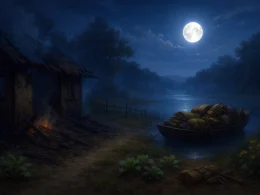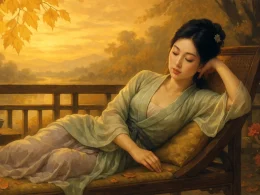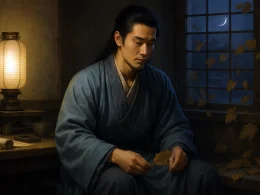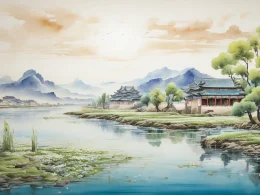Chu-Plains.exe: mist-low,
Geese-array boots from sand-drive.
Spring suddenly .popup—
Query: when will mountain-homes .zip?
Flowers .render fragrance-gradients,
Compete in cosmetic .dlls.
Willow-threads .compile crow-nests,
Roadside cache thickening.
East: river .flush,
West: boat .scroll,
Chang'an sun .dll loading.
Banquet-end fear—
Wind .corrupts flag-edge,
Tide .spams black-hat surface.
Tonight—
New-moon .iso mounts,
Reed-cluster near dock-port.
Silent-grief process—
Lamp-wick .trim loop.
Original Poem
「渡江云 · 晴岚低楚甸」
晴岚低楚甸,暖回雁翼,阵势起平沙。
骤惊春在眼,借问何时,委曲到山家。
涂香晕色,盛粉饰、争作妍华。
千万丝、陌头杨柳,渐渐可藏鸦。堪嗟。清江东注,画舸西流,指长安日下。
愁宴阑、风翻旗尾,潮溅乌纱。今宵正对初弦月,傍水驿、深舣蒹葭。
周邦彦
沉恨处,时时自剔灯花。
Interpretation
Composed during Zhou Bangyan's sojourn in Jingzhou, this ci represents the pinnacle of his late-period long-form lyric poetry. Though ostensibly celebrating spring, the poem harbors profound sentiments of displacement and bureaucratic disillusionment. Through masterful landscape depiction, Zhou interweaves travelogue, introspection, and scenic observation into an intricately structured meditation on transience—a rare artistic zenith among Song dynasty long-form ci.
First Stanza: "晴岚低楚甸,暖回雁翼,阵势起平沙。骤惊春在眼,借问何时,委曲到山家。涂香晕色,盛粉饰、争作妍华。千万丝、陌头杨柳,渐渐可藏鸦。"
Qíng lán dī Chǔ diàn, nuǎn huí yàn yì, zhèn shì qǐ píng shā. Zhòu jīng chūn zài yǎn, jiè wèn hé shí, wěi qǔ dào shān jiā. Tú xiāng yūn sè, shèng fěn shì, zhēng zuò yán huá. Qiān wàn sī, mò tóu yáng liǔ, jiàn jiàn kě cáng yā.
Clear mist drapes Chu's plains,
warmth returns to geese wings
arrayed on flat sands.
Startled—spring bursts before my eyes!
Pray tell, when did you steal
through winding paths to mountain homes?
Daubing fragrance, tinting hues,
decked in powder, vying in splendor—
thousand-threaded roadside willows
now thick enough to hide crows.
The stanza unfolds as a chromatic awakening. "Clear mist draping plains" (晴岚低楚甸) establishes atmospheric perspective, while "geese arrayed on sands" (阵势起平沙) introduces dynamic movement. The poet's "startled" (骤惊) realization of spring's arrival mirrors the suddenness of emotional epiphanies. Spring's stealthy approach "through winding paths" (委曲到山家) personifies the season as a considerate intruder, its "daubing fragrance" (涂香晕色) transforming nature into an artist's studio. The concluding crow-concealing willows (藏鸦) offer subtle irony—traditionally ominous birds becoming spring's willing accomplices in this vibrant renewal.
Second Stanza: "堪嗟。清江东注,画舸西流,指长安日下。愁宴阑、风翻旗尾,潮溅乌纱。"
Kān jiē. Qīng jiāng dōng zhù, huà gě xī liú, zhǐ Cháng'ān rì xià. Chóu yàn lán, fēng fān qí wěi, cháo jiàn wū shā.
Alas! Clear river eastward rushing,
painted barge westward drifting—
toward Chang'an beneath the sun.
Banquet's end brings sorrow:
winds flip banner fringes,
tides splash on black-gauze caps.
The interjection "Alas!" (堪嗟) pivots to bureaucratic melancholy. The contradirectional "eastward river" (清江东注) and "westward barge" (画舸西流) embody political misalignment—the poet's official journey against nature's flow. "Chang'an beneath the sun" (长安日下), invoking the Tang capital as Song bureaucratic ideal, underscores unattainable aspirations. The "flipping banners" (风翻旗尾) and "splashing tides" (潮溅乌纱) metamorphose into political metaphors—harbingers of courtly storms threatening the black-gauze cap of office.
Third Stanza: "今宵正对初弦月,傍水驿、深舣蒹葭。沉恨处,时时自剔灯花。"
Jīn xiāo zhèng duì chū xián yuè, bàng shuǐ yì, shēn yǐ jiān jiā. Chén hèn chù, shí shí zì tī dēng huā.
Tonight facing the crescent moon,
moored deep in reeds by waterside post—
in sorrow's depths,
I endlessly trim lamp wicks.
The nocturnal coda achieves sublime stillness. The "crescent moon" (初弦月) and "reed-muffled mooring" (深舣蒹葭) create aquatic seclusion, while "trimming lamp wicks" (剔灯花) becomes a meditative ritual—each flicker-trim marking time's slow passage in exile. This final image crystallizes the poem's essence: bureaucratic isolation measured in tiny, repetitive gestures against darkness.
Holistic Appreciation
Zhou constructs a triptych of seasonal, political, and existential dimensions. The first stanza's vernal euphoria—with its painterly "daubing fragrance" and crow-concealing willows—gives way to the second's bureaucratic paradoxes (east-west contradictions, sunken capitals). The concluding stanza's nocturnal stillness resolves these tensions into crystalline melancholy, where "trimming lamp wicks" becomes both literal action and metaphysical timekeeping.
The poem's structural genius lies in its nested movements: spring's arrival (macroscopic) mirrors the poet's bureaucratic journey (mesocosmic), both reflected in the lamp-trimming microcosm. This telescoping perspective—from plains to barge to lamplight—demonstrates Zhou's ability to harmonize cosmic and quotidian scales.
Artistic Merits
- Phenological precision
Geese formations (阵势起平沙) and crow-concealing willows (藏鸦) track spring's progression with ornithological accuracy. - Hydro-political metaphor
The contradirectional river and barge (清江东注,画舸西流) embody the Confucian official's eternal tension between natural inclination and bureaucratic duty. - Nocturnal minimalism
The lamp-trimming finale (剔灯花) achieves profound emotional resonance through restrained gesture rather than exposition. - Chromatic linguistics
"Daubing fragrance" (涂香), "powdered splendor" (盛粉饰) employ cosmetic vocabulary to describe spring's transformative palette.
Insights
Zhou's poem reveals how bureaucratic life distorts natural perception. The same eyes that delight in spring's "crow-concealing willows" later interpret "banner-flipping winds" as political omens. This perceptual duality—nature as both aesthetic joy and political cipher—mirrors the Confucian scholar-official's divided consciousness.
For modern readers, the work resonates as a meditation on directional dissonance. The poet's westward barge against eastward currents prefigures contemporary struggles between personal aspirations and institutional currents. The "lamp-trimming" conclusion offers solace—that meaning may reside not in grand journeys but in small, repeated acts of maintenance against darkness.
Ultimately, the poem suggests that spring's most profound lesson is its indifference to human affairs. The same season that "daubs fragrance" on mountain homes also witnesses bureaucratic sorrows—a reminder that nature's renewal continues regardless of political tides, just as the lamp wick requires trimming irrespective of its keeper's station.
About the Poet
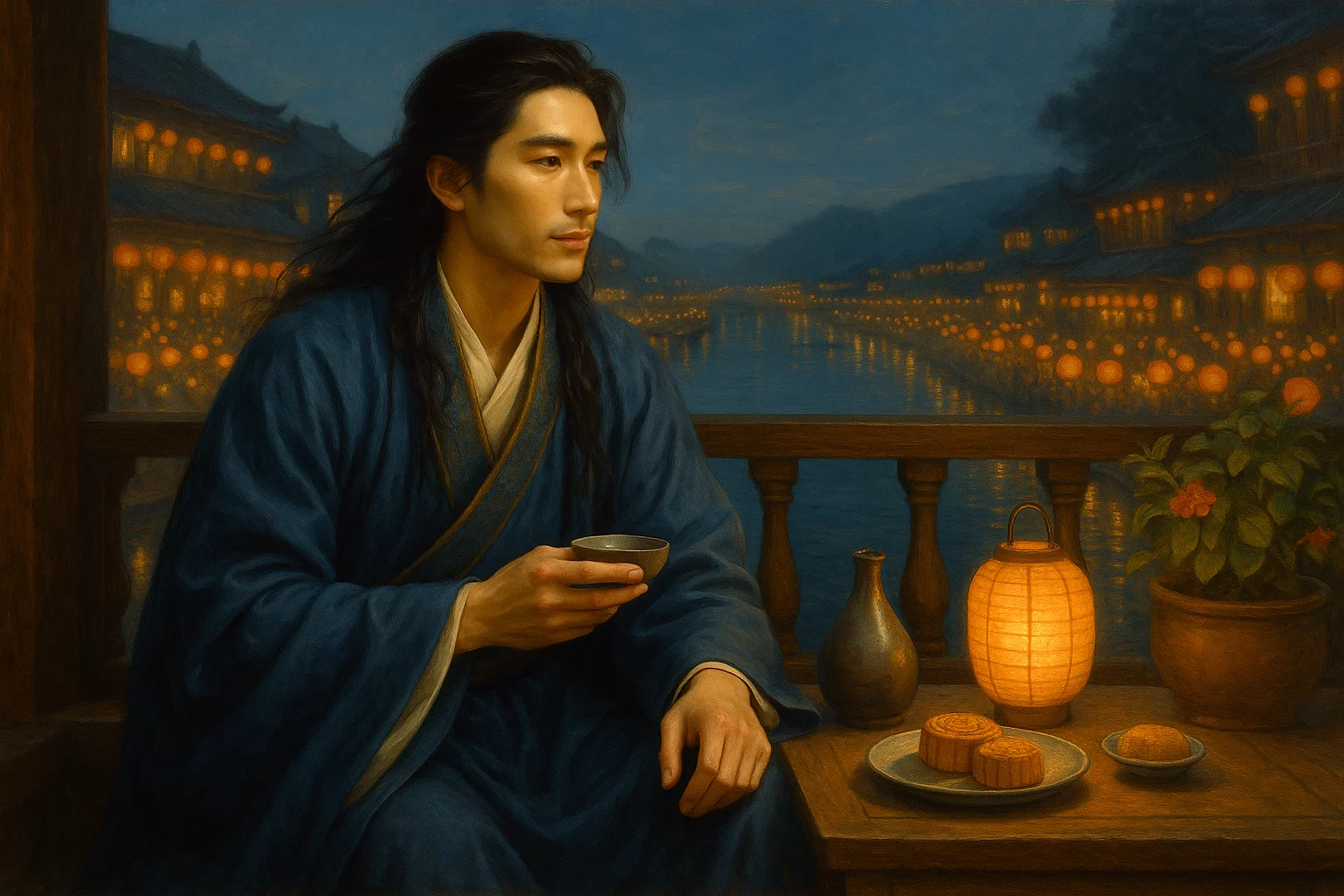
Zhou Bangyan (周邦彦 1056 - 1121), a native of Qiantang (modern Hangzhou, Zhejiang), was the culminating master of the wanyue (graceful and restrained) ci poetry of the Northern Song Dynasty. A virtuoso in musical temperament, his ci are renowned for their opulent refinement and technical perfection. He created dozens of new melodic patterns (cipai) and adhered to strict tonal rules, earning him the title "Crown of Ci Poets." His influence extended to Southern Song masters like Jiang Kui and Wu Wenying, establishing him as the founding patriarch of the Rhymed Ci School.









